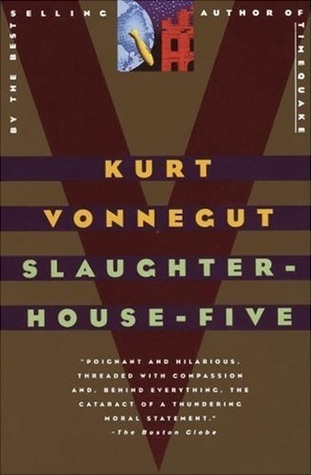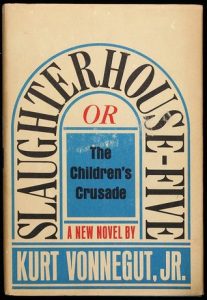 Slaughterhouse-Five by Kurt Vonnegut
Slaughterhouse-Five by Kurt Vonnegut Formats available: hardcover, paperback, ebook, audiobook
Pages: 215
Published by Dial Press Trade Paperback on January 12th 1999
Purchasing Info: Author's Website, Publisher's Website, Amazon, Barnes & Noble, Kobo, Bookshop.org
Goodreads
Kurt Vonnegut's absurdist classic Slaughterhouse-Five introduces us to Billy Pilgrim, a man who becomes unstuck in time after he is abducted by aliens from the planet Tralfamadore. In a plot-scrambling display of virtuosity, we follow Pilgrim simultaneously through all phases of his life, concentrating on his (and Vonnegut's) shattering experience as an American prisoner of war who witnesses the firebombing of Dresden.
Don't let the ease of reading fool you - Vonnegut's isn't a conventional, or simple, novel. He writes, "There are almost no characters in this story, and almost no dramatic confrontations, because most of the people in it are so sick, and so much the listless playthings of enormous forces. One of the main effects of war, after all, is that people are discouraged from being characters."
Slaughterhouse-Five is not only Vonnegut's most powerful book, it is also as important as any written since 1945. Like Catch- 22, it fashions the author's experiences in the Second World War into an eloquent and deeply funny plea against butchery in the service of authority. Slaughterhouse-Five boasts the same imagination, humanity, and gleeful appreciation of the absurd found in Vonnegut's other works, but the book's basis in rock-hard, tragic fact gives it a unique poignancy - and humor.
My Review:

Although I’m sure I knew it before, i was still surprised to see that Slaughterhouse Five was nominated for the Hugo Award for best science fiction novel in 1970. Slaughterhouse Five isn’t what we now think of SF. There are no spaceships (well, maybe one spaceship) and a debatable amount of faster than light or other than light travel. Instead, Slaughterhouse Five represents science fiction as the literature of ideas, and in that area, as in so many others it is a classic.
The winner of the 1970 Hugo was The Left Hand of Darkness by Ursula K. LeGuin. Slaughterhouse Five was in excellent company.
The climax of Slaughterhouse Five is the bombing of Dresden at the end of World War II. The protagonist, Billy Pilgrim, was a witness to that bombing, an American POW on the ground, or nearly under it, as the bombing took place. As one of the few survivors, he participated in the horrific clean up afterwards.
Billy Pilgrim is, to a greater or lesser extent, telling the author’s story at this point. In real life, Kurt Vonnegut was a POW held in Dresden during this incident, when allied forces reduced this once beautiful city to a rubble strewn landscape as barren and deadly as the moon.
This story is told by the unnamed narrator from a perspective at the end of Billy Pilgrim’s life. And because it is told at the end, the reader is never quite sure whether Billy really was unstuck in time, or whether he is just remembering the important bits of his life out of sequential order. And it doesn’t really matter.
Neither does the question of whether or not Billy really was kidnapped by the alien Tralfamadorians, who introduced to him the concept, or philosophy if you will, that every moment is forever, and that only remembering the good bits is the best way to manage existence.
What is certain is the Billy has post-traumatic stress disorder after his experience in Dresden. And who wouldn’t? Dresden comes last in the story, because it is the focus of everything. It is a moment of man’s absolute inhumanity to man, and Billy still can’t process it. So he keeps returning to it over and over, and every event that led to it, in an attempt to tell his truth.
Escape Rating B: I am glad I read Slaughterhouse Five. I had never read any of Vonnegut’s work before, but now I have a tiny glimpse into what made his work both so beloved, and so controversial at the same time. This review is being posted as a part of Banned Books Week, because Slaughterhouse Five is one of the most frequently challenged or banned books of the late 20th and early 21st centuries.
The bombing of Dresden was hidden from the American public for years after the war. It has been debated whether Dresden truly was a legitimate military target, or whether the entire purpose of the reduction of this formerly beautiful city to rubble was just to reduce what remained of German morale at the beginning of 1945. The bombing of Dresden caused as much of a loss of life as either Hiroshima or Nagasaki, minus the nuclear fallout. War is always hell.
Billy Pilgrim is a non-heroic hero. He is not brave in any way. He doesn’t serve with special distinction. But he survives, and manages the best he can, which in the end isn’t very well. He believes he’s done the best he can, coping with the uncope-able.
Having read the book, I’ll admit that I don’t understand the continuous attempts to ban it, particularly the most recent ones. There is profanity in this book. Many of Billy’s memories take place either among soldiers during wartime, or among POWs. I’d be more surprised if they didn’t cuss. There’s a little sex, and a lot of violence. Again, most humans manage to have a little sex, and talk about it a little more, over the course of a lifetime. And the terrible violence is part of an equally terrible war. The bombing of Dresden was nothing but violence. I will never understand the unwillingness of people to admit that what happened did in fact happen. Or those who believe that if we stop talking about the terrible past or the awful present, that it will somehow remove the worst events from history. A problem that has a great deal of resonance today.
It’s ironic that a story about the way that people in specific and humanity in general keep repeating the same mistakes over and over keeps getting banned and challenged, over and over. As that unnamed narrator says every time someone dies in the book, “And so it goes.”

















